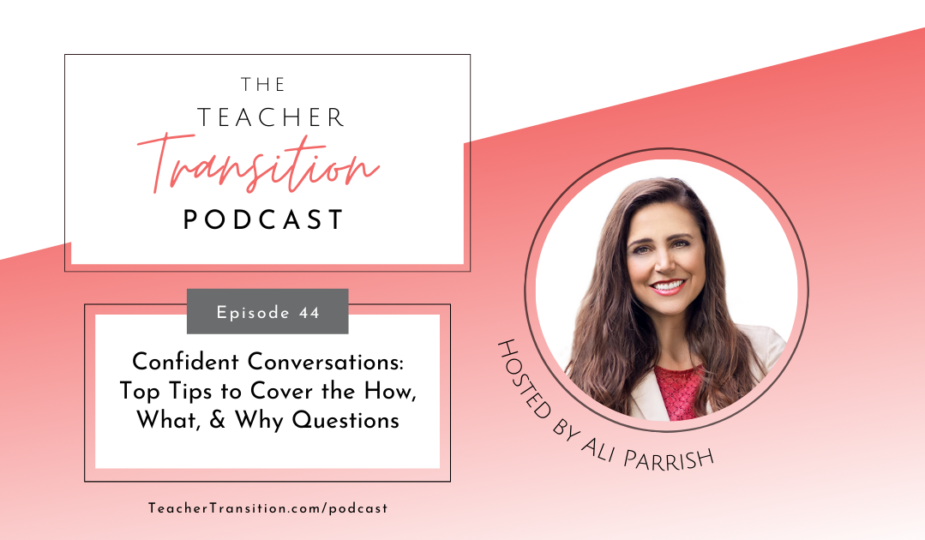Confident Conversations:
Top Tips to Cover the How, What,
& Why Questions
The Show Notes
Your transition is going to stir up a lot of questions with your friends, family, and community. Some will ask out of concern and others out of curiosity. If they are fellow teachers, they might be wondering what could be possible for them too! But in all of these, you’ll want to make sure these are confident conversations.
You don’t owe anyone an insider look into your decision-making process. But questions will come. Having a plan for how to respond with grace and confidence will eliminate a lot of stress – and the temptation to second-guess your new direction.
If you’re planning on resigning, think of three people it might feel the hardest to share your news with. Think about how you’ll feel. I bet you can guess exactly what questions they might ask. You might even know what doubts they would have too.
When you imagine having that conversation, what feelings come to the surface? Jot those down. A lot of times this brings up some insecurity and makes it hard to communicate. But if you take time to think through these answers, you’re going to be able to guide these confident conversations with ease.
The Why Questions
This type of question is very common. Well, why are you quitting? People are looking for some kind of rationale behind your decision. Especially if they respect the work you do as a teacher. There are ways you can frame it positively. Here are some ideas for how to begin a response:
The parts I love most about teaching are _____ and I’m pursuing opportunities to use those strengths for a larger percentage of my workday.
My family has some needs that have come up and another job offers me the flexibility I need to be able to take care of my family better.
I’m following the call. I’ve thought about it a lot and I’m ready to be challenged in a new direction.
Or if you’re good at not explaining yourself too much and are comfortable with a little awkward silence, you can just say: you know it just feels right.
The What Questions
People who know you are also going to be super curious about your plans. Some teachers will have something lined up right away. Others will just need a bit of a runway to make a plan. Either way, you can still have confident conversations when you say things like:
I’m looking forward to exploring _____and I’m curious about the opportunities available in _____.
I’m going to enjoy some time off for a while so I can _____.
Right now, I’m exploring opportunities in a few directions including _____ and _____.
The How Questions
Teachers are natural planners so we get a little uncomfortable if the path is not totally paved. But your transition out of the classroom isn’t the same as a lesson plan. You do have an objective, but you have a little less control over the outcome. Why? You’ve literally never done this before.
So when the how questions pop up, try to focus on what you do know, rather than what you don’t. You don’t have to have a position lined up. If you have a path and resources, like a course or a community, then talk about why you’re excited about that!
Staying in Control of These Confident Conversations
At the end of the day, you have to remember that no one is entitled to all the details of this big decision you’re making. Just because they ask doesn’t mean they get an answer. You can be prepared with some of these sentence templates, but sometimes people are asking too much. That’s when you can redirect the conversation and ask how they are doing.
Could you use the extra support in taking the next step after the classroom?
Join the membership!
If you enjoyed this episode I invite you to take a screenshot and tag me on your Instagram stories @teachertransition and tell me your biggest takeaway!
Resources Mentioned in the Show
Wondering whether you’d enjoy being a trainer or an instructional designer? take the quiz to see which role you’d prefer!
- Join the Teacher Transition Membership!
- Teacher Transition on Facebook
- Teacher Transition on Instagram
- Become an Instructional Designer in 6 weeks!
